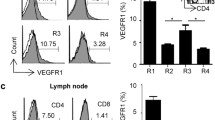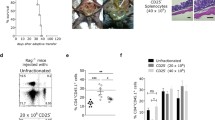Abstract
Background
To provide rapid immunosuppression without side effects, we analyzed whether rapamycin alone, and regulatory T cells (Tregs) expanded ex vivo by rapamycin, suppressed colitis in a mouse model.
Methods
Severe combined immunodeficiency (SCID) mice reconstituted with naive CD4+ T cells were treated with or without intraperitoneal rapamycin. Body weight was evaluated. CD4+ T cells were cultured in the presence of rapamycin for three 7-day rounds of stimulation. The ratio of Tregs to CD4+ T cells was analyzed by flow cytometry. Naive CD4+ T cells were transferred into SCID mice with CD4+ T cells expanded in the presence or absence of rapamycin. Clinical symptoms of colitis, histological changes, and cytokine expression were investigated.
Results
Systemic rapamycin partially prevented the development of colonic inflammation in a transfer model of colitis, but decreased body weight in control mice. With rapamycin, stimulated CD4+ T cells expanded eightfold in 3 weeks in vitro, and the proportion of Tregs increased to about 40%. Without rapamycin, CD4+ T cells expanded 20-fold in 3 weeks, but the proportion of Tregs remained at about 15%. CD4+ T cells expanded with rapamycin prevented the development of colitis in a naïve CD4+ T-cell transfer model, in association with the downregulation of Th1 and Th17 responses.
Conclusions
We demonstrated, for the first time, that CD4+ T cells expanded with rapamycin in vitro suppressed colitis. Therefore, rapamycin-expanded Treg transfer therapy is expected to be efficacious for inflammatory bowel disease.






Similar content being viewed by others
References
Strober W, Fuss I, Mannon P. The fundamental basis of inflammatory bowel disease. J Clin Invest. 2007;117:514–21.
Ardizzone S, Cassinotti A, Manes G, Porro GB. Immunomodulators for all patients with inflammatory bowel disease? Therap Adv Gastroenterol. 2010;3:31–42.
Kahan BD, Camardo JS. Rapamycin: clinical results and future opportunities. Transplantation. 2001;72:1181–93.
Busca A, Locatelli F, Moscato D, Falda M. Sirolimus-related toxicity in stem cell transplantation. Biol Blood Marrow Transpl. 2005;11:647–9.
Abraham RT, Wiederrecht GJ. Immunopharmacology of rapamycin. Annu Rev Immunol. 1996;14:483–510.
Qu Y, Zhang B, Zhao L, Liu G, Ma H, Rao E, et al. The effect of immunosuppressive drug rapamycin on regulatory CD4+CD25+Foxp3+ T cells in mice. Transpl Immunol. 2007;17:153–61.
Farkas S, Hornung M, Sattler C, Guba M, Steinbauer M, Anthuber M, et al. Rapamycin decreases leukocyte migration in vivo and effectively reduces experimentally induced chronic colitis. Int J Colorectal Dis. 2006;21:747–53.
Matsuda C, Ito T, Song J, Mizushima T, Tamagawa H, Kai Y, et al. Therapeutic effect of a new immunosuppressive agent, everolimus, on interleukin-10 gene-deficient mice with colitis. Clin Exp Immunol. 2007;148:348–59.
Kopf H, de la Rosa GM, Howard OM, Chen X. Rapamycin inhibits differentiation of Th17 cells and promotes generation of FoxP3+ T regulatory cells. Int Immunopharmacol. 2007;7:1819–24.
Ogino H, Nakamura K, Ihara E, Akiho H, Takayanagi R. CD4(+)CD25(+) regulatory T cells suppress Th17-responses in an experimental colitis model. Dig Dis Sci. 2011;56:376–86.
Sumida Y, Nakamura K, Kanayama K, Akiho H, Teshima T, Takayanagi R. Preparation of functionally preserved CD4+CD25high regulatory T cells from leukapheresis products from ulcerative colitis patients, applicable to regulatory T-cell transfer therapy. Cytotherapy. 2008;10:698–710.
Lyones AB, Parish CR. Determination of lymphocyte division by flow cytometry. J Immunol Methods. 1994;171:131–7.
Mudter J, Wirtz S, Galle PR, Neurath MF. A new model of chronic colitis in SCID mice induced by adoptive transfer of CD62L+CD4+ T cells: insights into the regulatory role of interleukin-6 on apoptosis. Pathobiology. 2002;70:170–6.
Fantini MC, Becker C, Tubbe I, Nikolaev A, Lehr HA, Galle P, et al. Transforming growth factor β induced FoxP3+ regulatory T cells suppress Th1 mediated experimental colitis. Gut. 2006;55:671–80.
Honda K, Nakamura K, Matsui N, Takahashi M, Kitamura Y, Mizutani T, et al. T helper 1-inducing property of IL-27/WSX-1 signaling is required for the induction of experimental colitis. Inflamm Bowel Dis. 2005;11:1044–52.
Kasajima A, Pavel M, Darb-Esfahani S, Noske A, Stenzinger A, Sasano H, et al. mTOR expression and activity patterns in gastroenteropancreatic neuroendocrine tumours. Endocr Relat Cancer. 2011;18:181–92.
Battaglia M, Stabilini A, Migliavacca B, Horejs-Hoeck J, Kaupper T, Roncarolo MG. Rapamycin promotes expansion of functional CD4+CD25+FOXP3+ regulatory T cells of both healthy subjects and type 1 diabetic patients. J Immunol. 2006;177:8338–47.
Sakaguchi S. Regulatory T cells: key controllers of immunologic self-tolerance. Cell. 2000;101:455–8.
Takahashi T, Kuniyasu Y, Toda M, Sakaguchi N, Itoh M, Iwata M, et al. Immunologic self-tolerance maintained by CD25+CD4+ naturally anergic and suppressive T cells: induction of autoimmune disease by breaking their anergic/suppressive state. Int Immunol. 1998;10:1969–80.
Mottet C, Uhlig HH, Powrie F. Cutting edge: cure of colitis by CD4+CD25+ regulatory T cells. J Immunol. 2003;170:3939–43.
Maul J, Loddenkemper C, Mundt P, Berg E, Giese T, Stallmach A, et al. Peripheral and intestinal regulatory CD4+CD25(high) T cells in inflammatory bowel disease. Gastroenterology. 2005;128:1868–78.
Takahashi M, Nakamura K, Honda K, Kitamura Y, Mizutani T, Araki Y, et al. An inverse correlation of human peripheral blood regulatory T cell frequency with the disease activity of ulcerative colitis. Dig Dis Sci. 2006;51:677–86.
Makita S, Kanai T, Oshima S, Uraushihara K, Totsuka T, Sawada T, et al. CD4+CD25bright T cells in human intestinal lamina propria as regulatory cells. J Immunol. 2004;173:3119–30.
Holmén N, Lundgren A, Lundin S, Bergin AM, Rudin A, Sjövall H, et al. Functional CD4+CD25 high regulatory T cells are enriched in the colonic mucosa of patients with active ulcerative colitis and increase with disease activity. Inflamm Bowel Dis. 2006;12:447–56.
Battaglia M, Stabilini A, Roncarolo MG. Rapamycin selectively expands CD4+CD25+FoxP3+ regulatory T cells. Blood. 2005;105:4743–8.
Strauss L, Whiteside TL, Knights A. Selective survival of naturally occurring human CD4+CD25+Foxp3+ regulatory T cells cultured with rapamycin. J Immunol. 2007;178:320–9.
Gao W, Lu Y, El Essawy B. Contrasting effects of cyclosporine and rapamycin in de novo generation of alloantigen-specific regulatory T cells. Am J Transpl. 2007;7:1722–32.
Acknowledgments
We thank Drs. Youhei Tokita and Masahiro Yamamoto for assistance with the real-time RT-PCR, and Ms. Akiyo Kondo for assistance with the preparation of colonic sections. This work was supported in part by Grants from the Japanese Ministry of Education, Culture, Sports, Science and Technology.
Conflict of interest
None.
Author information
Authors and Affiliations
Corresponding author
Rights and permissions
About this article
Cite this article
Ogino, H., Nakamura, K., Iwasa, T. et al. Regulatory T cells expanded by rapamycin in vitro suppress colitis in an experimental mouse model. J Gastroenterol 47, 366–376 (2012). https://doi.org/10.1007/s00535-011-0502-y
Received:
Accepted:
Published:
Issue Date:
DOI: https://doi.org/10.1007/s00535-011-0502-y




